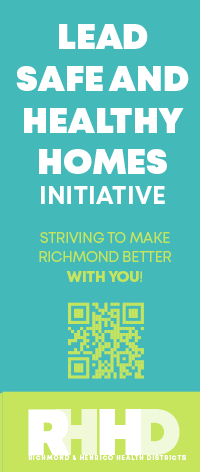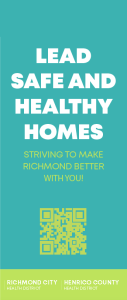
Helping Richmond residents keep homes and families safe
We offer healthy housing services using an integrated approach that considers the well-being of the occupants, the structure, and the potential health and safety hazards. Our two main programs are the Lead Safe Program and the Healthy Home Initiative. On this page, you can learn more about our programs and how we can help you keep your family safe from lead exposure and other household hazards such as mold and pests.
Lead Safe Program
The goal of the Lead Safe Program is to eliminate childhood lead poisoning in the City of Richmond. Childhood lead poisoning is a completely preventable disease that may be caused by a number of sources in a child’s environment. However, the most common source is chipping/peeling paint and lead contaminated dust (from lead-based paint) in houses built before 1978.
Lead interferes with normal brain development and may cause reduced intelligence, behavioral problems, and learning disabilities in children. Children who have lead poisoning may not show any early signs or symptoms. Therefore, having your child tested is the only way to know for sure whether he/she is lead poisoned. Ask your child’s doctor to perform this simple test.
Research has shown that it may be possible for pregnant women to pass lead to their unborn fetus. Pregnant women should take certain precautions to protect themselves and their unborn child. This is especially important if they work in an industry that may expose them to lead or if they suspect that they were lead poisoned as a child.
The Lead Safe Program provides lead education, screening, and free lead risk assessments/inspections for lead poisoned children. Please call (804) 205-3726 for information.
STEPS TO HELP PREVENT LEAD POISONING
- Wet clean floors and windowsills in the home regularly.
- Wash children’s hands and toys frequently.
- Be aware of chipping paint in the home. Use lead-safe practices to make sure painted surfaces are maintained or repaired. Improper paint repairs could create more hazardous lead poison conditions. Call the Health Department for advice.
- Be aware of toys, jewelry, dishes, pottery, and foods that may contain lead.
- Be aware of hobbies or jobs that may involve working with lead (stained glass making, pottery, painting/construction work).
Learn more about what the Lead-Safe and Healthy Homes Program can do for you! Information for tenants and homeowners/landlords is included.
New Virginia Department of Health Blood Lead Testing and Case Management Guidelines (PDF) and VDH Lead safe website for additional resources.
- Childhood Lead Poisoning Prevention Brochure (PDF-1.8MB)
- EPA Certified Guide to Renovate Right (opens in new tab)
- Federal Real Estate Lead Paint Disclosure Requirement (opens in new tab)
- CDC: Lead (opens in new tab)
- HUD Lead and Healthy Homes (opens in new tab)
- Children’s Environmental Health Network (opens in new tab)
The Healthy Homes Initiative
The Richmond City Health District's Lead-Safe & Healthy Homes Initiative (LSHHI) takes a holistic approach to preventing diseases and injuries that result from housing-related hazards and deficiencies. We empower citizens and the Richmond community through education and intervention to properly maintain a healthy and safe home.
[Download Lead Safe and Healthy Homes brochure (PDF-141KB)]
Through the City funding, we offer free Healthy Homes Assessment to residents of Richmond City if there is a concern that the housing condition is causing a safety concern or aggravating one's health problem. Please call 804-205-3500 Ext 7 to leave a home assessment inquiry.
We offer free group workshops to the Richmond City communities. We also provide customized (fees applied) half-day or day-long workshops covering multiple topics. To schedule a session, please call Yvonne Johnson at (804) 205-3727.
Healthy Homes Workshop Training Brochure (PDF-622KB)
Healthy Home Tips and Practices:
- Healthy Homes Dos and Don’ts Around the Home Guide (PDF-512KB) (English or Spanish)
- Guía del programa Hogares Saludables sobre lo que debe y no debe hacer en el hogar (PDF-547KB)
- Use of Low-Toxic and Safe Household Cleaners (PDF-504KB)
- Limpiadores domésticos más seguros (PDF-622KB)
- Smoke Free Residential Tool Kits (PDF-5MB)
- Quit Now (opens in new tab)
- Healthy Homes spring cleaning tips (600KB)
Richmond City Healthy Homes Coalition
The goal of the LSHHI, along with our many community partners, is to address home-based factors that can result in injury or illness and/or exacerbate or prolong existing health problems. We help provide residents with an understanding of the cause and effect linkage of housing related conditions to health outcomes and provide recommendations for prevention, remediation, and referrals for intervention.
Coalition Vision and Mission (PDF-409KB)
Coalition Partners List (PDF-160KB)
- Controlling Home-Based Asthma Triggers (English or Spanish)
- VA Department of Health Asthma Burden Report
- Children’s Hospital of Richmond at VCU – You Can Control Asthma Now (UCAN) Program
- Centers for Disease Control and Prevention – Asthma
- Asthma and Allergy Foundation of America
- Asthma Community Network
Presently, there are no federal, state or local regulations pertaining to mold in residential buildings. Mold in rental units are the responsibilities of landlords and tenants regarding prevention, control and/or abatement of mold.
- Landlord Immunity in Compliance with Residential Lead-Based Paint (PDF-16KB)
- VA Residential Landlord Tenant Act 2015 (opens in new tab)
- Retaliation Prohibited by Landlord (PDF-16KB)
- Overview of Tenant Responsibilities (PDF-83KB)
- Pest Management Issues and Landlord-Tenant Responsibilities (PDF-300KB)


